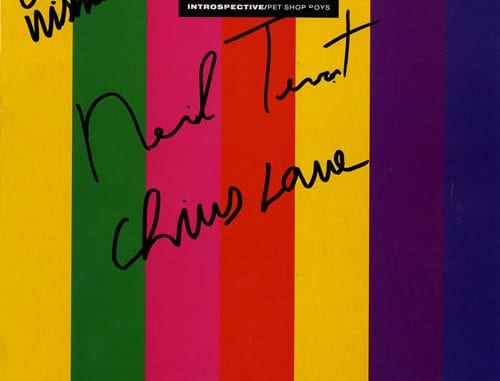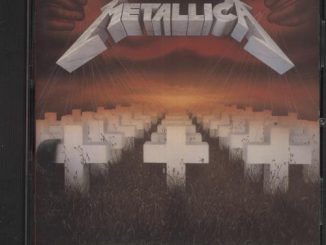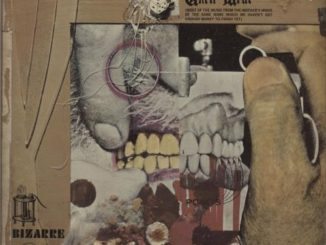
The phrase “left to one’s own devices” entered routine English usage around 1300, by way of the Old French “à mon, ton, etc. devis”.
Device in this sense means “will, pleasure, inclination, fancy, desire” — one’s devices are little more than intuitive whims in absence of council, which guide us through our daily lives. The lyrics to Pet Shop Boys’ ‘Left To My Own Devices’ — the opening track on their third LP, Introspective, released thirty years ago in October — ostensibly gesture toward the potential gravity of such capricious decision-making: “I could leave you, say goodbye / or I could love you, if I try.”
In this song, “device” also encourages other interpretations, which imply intimacy and ambivalence at the hands of the contemporary technologies on offer in 1988: communications devices like mobile phones and satellite television; digital musical instrument devices such as synthesizers and sequencers; consumer electronic devices like CD players and Walkmans; networked devices like modems and faxes; even sexual devices that might render a partner unnecessary. All of these devices, which make modern life more seamless and convenient, bring us closer and isolate us at once, supplanting personal contact for user interfaces, speakers, and screens.
Introspective’s iconic color-bar cover image suggests a screen, too — a blank one — the ubiquity and immanence of ambient media. At first glance, it’s a test pattern, but weird, stylized, minimal, and almost electronic looking in its visual coincidence of gold, complimentary red and green, and an array of shocking pinks. The artwork also represents the album’s structure — six monolithic, extended dance tracks rather than a dozen or so shorter singles, which was a bold break from 1980s pop music convention that made the record more conducive to nightclub DJs and home listeners than casual radio airplay.
Nevertheless, an edited version of Pet Shop Boys’ Acid House rendition of Johnny Christopher, Mark James, and Wayne Carson’s ‘Always On My Mind’, perhaps best recognized as a sentimental country ballad sung by Willie Nelson in 1982, was the world’s third-highest charting single six years later. The 12-inch mix that also appears on the album contains an unexpected middle section called ‘In My House’, a minor-key detour featuring additional lyrics that relate to the original: “I worked so hard, I thought you knew / my love I did it all for you / I never really had the time / I guess you couldn’t read my mind.”
These phrases are subtly manipulated up and down in pitch, a technological trick that calls attention to the artificiality and malleability of media forms. Long before Auto-Tune, Pet Shop Boys’ manipulation of vocality effectively queered the refrain, entreating a subversive politics of frequency: these variations in tone and timbre rendered singer and muse more ambiguous, and also upended the song’s presumed hetero-normative orientation. When Willie Nelson sings ‘Always On My Mind’, we can be fairly certain that it is a man addressing a female lover; with Pet Shop Boys’ version, those positions and dynamics are no longer clear.
I was raised on country music, particularly the 1970s outlaw artists like Merle Haggard, Waylon Jennings, and especially Willie Nelson. The kinds of love songs these men sang were unimpeachably seminal and virile at the time, and it was exciting for those assumptions to be overturned by a British disco duo. Pet Shop Boys embodied a sense of masculine sensitivity, a Jungian world of ideas and concepts rather than things and people, an introverted character and temperament that I identified with. I was also at a difficult age, similarly wanting for strength and joy. And suddenly, here was music that appeared to speak directly to me.
What likewise appealed immediately about Introspective was its wholly state-of-the-art aesthetic. Music made with computers and samplers seemed so radical and futuristic, optimistic about the blurring of boundaries between techno and human agency — the relentless pursuit of mechanical and digital perfection. What electronic music’s critics now pejoratively identify as the rigid and angular sound of quantized MIDI sequencing was then considered its most desirable quality: drum machines and computers didn’t miss notes, they don’t lose their tempo or flub a chorus; they perform precisely, the same way, time after time.
The first time I heard Introspective was in a high-end hi-fi shop that my parents used to take me to, in a suburban strip mall before going to the movies. I loved gawking at all those sleek stereos — Bang and Olufsens looked straight out of science fiction — and listening to CDs, which were still new to my ear, and still signaled magic in their complete elimination of the surface noise that accompanied analogue recordings. On top of the digital perfection of Pet Shop Boys’ musical programming, there was additionally the digital perfection of the compact disc, and the unbroken chain of digitality — from recording, to mixing and mastering, to distribution format.
CDs almost struck me as divine, of alien origin, and worthy of worship. I loved Introspective not only because of the music, and the interior realms that it conjured, but also because it was on CD, because of all the devices that it implicated, and how wonderfully technologically advanced it all was. These things made the future seem like a shining place to be facing, not the cynical, caustic, dispassionate, algorithmically regulated digital dystopia that subsequently ensued. Digitality — its permanence and infinite replicability — somehow made the otherwise vulnerable Pet Shop Boys exude invincibility, in a world of their own.
In 2018, there is no lonelier a spectacle than a train car-full of people hurtling from non-place to non-place, from station to station, all staring down in silence, engrossed in their own devices. But 1988 was a high note, culturally speaking, for a pervasive belief, in the west at least, that technology and mass media could genuinely improve people’s lives, and that those improvements were inevitable. Introspective is a document of that confidence, a testament to music technology’s timeless wavelengths, and a clear-eyed articulation of the sincere hope that things were going to be alright.
Ryan Alexander Diduck is the author of Mad Skills: MIDI and Music Technology in the 20th Century. Find him on Twitter. Taken from FACT Mag
eil.com – the world’s best online store for rare, collectable and out of print Vinyl Records, CDs & Music memorabilia since 1987
See our latest Pet Shop Boys items in stock below (updates automatically when new stock is added)
- Pet Shop Boys - West End Girls - Small Pic Label - UK - 12" vinyl - £15.00, $19.80, €17.55 (Back In Stock) (arrived 16-Apr-2025 16:00)
PET SHOP BOYS West End Girls (1985 UK 3-track 12" single with 4" picture labels, including the Dance Mix & Original Version plus A Man Could Get Arrested. housed in a non die-cut picture sleeve. The sleeve shows minimal wear and the vinyl displays some very light paper hairlines, not impacting play 12R6115)
- Pet Shop Boys - Domino Dancing - Double Sleeve issue - UK - 12" vinyl - £25.00, $33.00, €29.25 (New Item) (arrived 28-Mar-2025 10:49)
PET SHOP BOYS Domino Dancing (1988 UK limited edition 3-track 12" vinyl single featuring the Disco and Alternative remixes plus Don Juan [Disco Mix], with both the picture outer and picture inner sleeves. There is a little edgewear to the outer sleeve and despite some minor surface scuffs showing evidence of play, the vinyl remains in excellent condition 12RS6190)
- Pet Shop Boys - Nonetheless - Zoetrope Picture Disc Edition - Hand Numbered - UK - picture disc LP - £124.99, $164.99, €146.24 (New Item) (arrived 27-Mar-2025 17:00)
PET SHOP BOYS Nonetheless (2024 UK/EU limited edition 10-track Zoetrope Animated Picture Disc LP with artwork that creates a visual illusion when the record is spinning and viewed through your smartphone camera. Featuring the lead single Loneliness, the songs are very melodic and quintessentially Pet Shop Boys with a fresh, open sound, bringing together classic strands of PSB song-writing and moving them in new directions. Picture sleeve individually hand-numbered andlimited to just 4000 copies)
- Pet Shop Boys - Flamboyant - Sealed - UK - 12" vinyl - £19.99, $26.39, €23.39 (New Item) (arrived 27-Mar-2025 17:00)
PET SHOP BOYS Flamboyant (Original 2004 UK limited edition 3-track 12" vinyl single including DJ Hell and Scissor Sisters mixes plus West End Girls [DJ Hell Remix]. This copy remains sticker-sealed in the original glossy picture sleeve with gold-embossed text and inner bag - brand new & unplayed! 12R6629)
- Pet Shop Boys - It's Alright - UK - 12" vinyl - £20.00, $26.40, €23.40 (New Item) (arrived 27-Mar-2025 17:00)
PET SHOP BOYS It's Alright (1989 UK 3-track 12" vinyl single - includes One Of The Crowd and Your Funny Uncle, issued in a great picture sleeve. The sleeve shows a little wear and the vinyl 12RS6220)
- Pet Shop Boys - Where The Streets Have No Name - UK - 12" vinyl - £20.00, $26.40, €23.40 (New Item) (arrived 27-Mar-2025 17:00)
PET SHOP BOYS Where The Streets Have No Name (1991 UK 3-track 12" vinyl single, a great cover and mix of two very different, but classic tracks: U2's Where The Streets Have No Name and Frankie Valli's I Can't Take My Eyes Off You. An idea onlythe Pet Shop Boys could come up with and make it work. The single also includes How Can You Expect To Be Taken Seriously [Extended Mix] and Bet She's Not Your Girlfriend. Both the picture sleeve and vinyl appear in EX condition 12R6285)
- Pet Shop Boys - So Hard - EX - UK - 12" vinyl - £15.00, $19.80, €17.55 (New Item) (arrived 27-Mar-2025 17:00)
PET SHOP BOYS So Hard (1990 UK 3-track 12" vinyl single including the Extended Dance & Dub remixes plus It Must Be Obvious. The picture sleeve displays some minor general wear and the vinyl shows only light signs of play, overall an an Excellent example 12R6269)
- Pet Shop Boys - Go West - UK - 12" vinyl - £25.00, $33.00, €29.25 (New Item) (arrived 27-Mar-2025 17:00)
PET SHOP BOYS Go West (1993 UK 3-track 12" vinyl single featuring First & Second Movement, Farley And Heller Disco and Kevin Saunderson Tribe remixes, glossy picture sleeve. The sleeve shows only minor edgewear and the vinyl appears seldom played 12R6356)




Be the first to comment